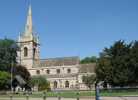For this church:    |
|
| This Church of Peverelthorpe The Noble and Generous Prince Evelyn Duke of Kingston Knight of the Garter rebuilt in the year 1744 |
This church building was in turn taken down in between 1863 and 1879, a remnant of which can be seen at the eastern end of the churchyard, the memorial to Charles Alphonso Pierrepont.
White’s Directory, dated 1853, reports the church building was situated in the [Thoresby] Park and is of an elegant stone fabric, having some beautiful stained glass in the windows. In the niches at the west end are carved figures of Hope and Meekness, and at the east end is a neat monument in memory of Charles Alphonso Pierrepont.
The Current Church
The present Church building of St John the Evangelist, which you see, may look to have a timeless aura but, in fact, it was rebuilt just after the third Thoresby Hall (1865-75). The third Earl Manvers, who commissioned the building designs from Anthony Salvin (1779-1881), champion of early and mid-Victorian neo-Tudor design in England ever since his design of Harlaxton Manor, Lincolnshire. Some of the detail at the Hall is assessed by Nikolas Pevsner as disappointing, especially in comparison with the ingenuity of the detail at Harlaxton, and may be by Osbert, Anthony Salvin’s son.
The present churchyard incorporating the church building is a little over one and a half acres in size, and is amidst a rural and otherwise mature landscape of Thoresby Park. The building is a solid Victorian Gothic structure, with a four pinnacle tower with a tall spire being some 128 feet overall, which can be seen above the tree tops of the park. It will be noted that on inspection of the exterior of the church building, set against the Salvin drawings, the chimney on the north side is now absent. The faces on the pillars within the Nave represent Christ’s twelve Apostles. John, the beardless one, is well positioned over the pulpit, being the patron saint of the church. Carved stone foliage capitals are also of great interest on some of the columns.






